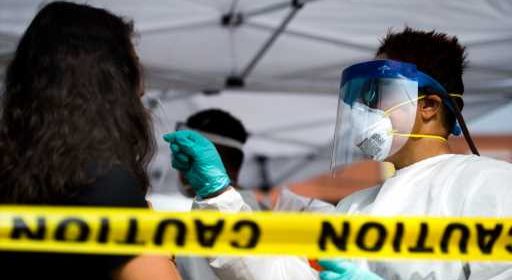As Colorado’s COVID hospitalizations keep rising, Polis considers larger role for National Guard

Gov. Jared Polis sounded the alarm Thursday about the persistent increase in COVID-19 hospitalizations in Colorado, saying the state will consider using the National Guard to help ease “our hospital capacity crisis.”
The number of patients with the virus in Colorado hospitals generally has increased since late July, even as those numbers have dropped significantly on a national level over the last month.
As of Thursday, there were fewer acute-care beds available statewide than during the deadly late-2020 wave when COVID-19 hospitalizations peaked on Dec. 1.
More than 90% of the state’s intensive-care beds also were in use, meaning just 123 ICU beds were open Thursday, according to data from the Department of Public Health and Environment.
The governor said the rise in patients “is a very stark reminder for anybody who thought the pandemic was over.”
“Of course, we’re also looking at what (the National Guard) can do to help end the pandemic — helping with the additional booster and kids (vaccination) drive, but also helping with our hospital capacity crisis that we have, especially in El Paso County,” Polis said during a news briefing.
So far, Colorado has dispatched 12 guard members to assisted-living facilities and group homes via the state’s emergency health care staffing center, which was reactivated last month to help hospitals with the rise in patients, a spokesperson with the Department of Public Health and Environment said Thursday.
In this capacity, they are able to work as “qualified medication administration personnel,” which allows them to administer medicine in certain settings, the unidentified health department spokesperson said in an email.
However, National Guard troops are not licensed health care employees.
The Colorado National Guard also can be sent to help hospitals, as has occurred in other states such as California, where National Guard medical teams have been sent to bolster staffing at rural hospitals.
No Colorado guard members were assigned to hospitals as of Thursday, according to the health department.
It’s not the first time Colorado officials have called on the National Guard to help respond to the pandemic. Over the past year, guard members assisted with staffing at nursing homes and with the state’s mass campaign to get residents vaccinated against the coronavirus.
On Thursday, 811 acute-care beds were available statewide and 1,130 patients were hospitalized with confirmed COVID-19 – the highest number of hospitalizations since Christmas.
By comparison, there were 1,845 acute-care beds available in Colorado on Dec. 1 despite the state having 717 more coronavirus patients hospitalized at the time, Scott Bookman, the state’s COVID-19 incident commander, said during the news conference.
“Surgeries are being canceled, brain surgeries, heart surgeries are being delayed because of a lack of availability to provide care to those patients due to the impact of COVID hospitalizations,” Bookman said in a news release.
Almost 80% of the patients currently hospitalized with the virus are unvaccinated, according to the state health department.
“If you haven’t been vaccinated, you’re facing a grave threat of the deadly virus, really everywhere you go, and it’s really important you get vaccinated to protect yourself and others,” Polis said.
The strain on Colorado’s hospital capacity isn’t just due to the increase in patients with COVID-19. Since the summer, hospitals have reported more cases of other respiratory viruses. The state also is entering the yearly flu season.
And hospitals are treating more people with accidental injuries and illnesses, including patients who have more severe symptoms because they postponed care during the pandemic, said Cara Welch, spokeswoman for the Colorado Hospital Association.
As of Thursday, 36% of hospitals anticipated staffing shortages within the next week, according to state health department data.
There are multiple factors leading to workforce issues, including the exodus of health care employees leaving the industry due to burnout and trauma from being on the frontlines of the pandemic. Nurses also are leaving hospital positions for traveling agencies, which let them work on a temporary basis in other states, while making higher wages and large bonuses, Welch said.
It’s still too early to know how many health care workers have left the field because they refused to get COVID-19 vaccines under the statewide mandate, which gives them until the end of the month to get inoculated. For example, only a small percentage — less than 0.5% — of health care workers were fired by UCHealth for not getting the shots under that system’s mandate.
Source: Read Full Article